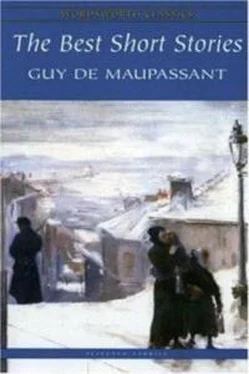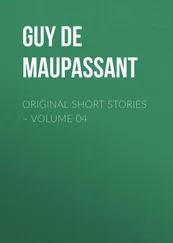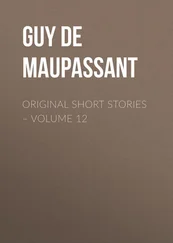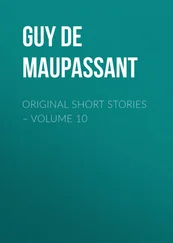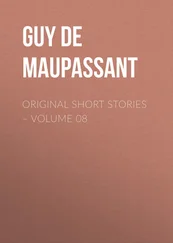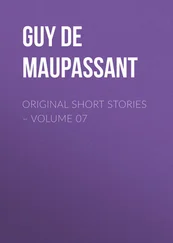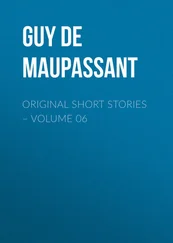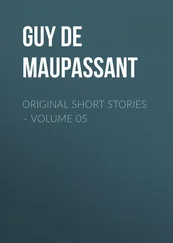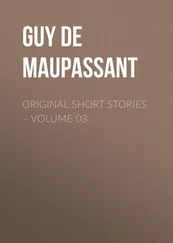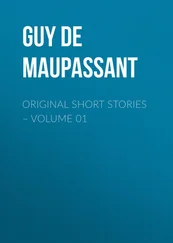"I have been through the boulevards to–day."
Two or three times a year her husband took her to the theatre. These were events the remembrance of which never grew dim; they provided subjects of conversation for long afterward.
Sometimes three months afterward she would suddenly burst into laughter, and exclaim:
"Do you remember that actor dressed up as a general, who crowed like a cock?"
Her friends were limited to two families related to her own. She spoke of them as "the Martinets" and "the Michelins."
Her husband lived as he pleased, coming home when it suited him —sometimes not until dawn—alleging business, but not putting himself out overmuch to account for his movements, well aware that no suspicion would ever enter his wife's guileless soul.
But one morning she received an anonymous letter.
She was thunderstruck—too simple–minded to understand the infamy of unsigned information and to despise the letter, the writer of which declared himself inspired by interest in her happiness, hatred of evil, and love of truth.
This missive told her that her husband had had for two years past, a sweetheart, a young widow named Madame Rosset, with whom he spent all his evenings.
Bertha knew neither how to dissemble her grief nor how to spy on her husband. When he came in for lunch she threw the letter down before him, burst into tears, and fled to her room.
He had time to take in the situation and to prepare his reply. He knocked at his wife's door. She opened it at once, but dared not look at him. He smiled, sat down, drew her to his knee, and in a tone of light raillery began:
"My dear child, as a matter of fact, I have a friend named Madame Rosset, whom I have known for the last ten years, and of whom I have a very high opinion. I may add that I know scores of other people whose names I have never mentioned to you, seeing that you do not care for society, or fresh acquaintances, or functions of any sort. But, to make short work of such vile accusations as this, I want you to put on your things after lunch, and we'll go together and call on this lady, who will very soon become a friend of yours, too, I am quite sure."
She embraced her husband warmly, and, moved by that feminine spirit of curiosity which will not be lulled once it is aroused, consented to go and see this unknown widow, of whom she was, in spite of everything, just the least bit jealous. She felt instinctively that to know a danger is to be already armed against it.
She entered a small, tastefully furnished flat on the fourth floor of an attractive house. After waiting five minutes in a drawing–room rendered somewhat dark by its many curtains and hangings, a door opened, and a very dark, short, rather plump young woman appeared, surprised and smiling.
George introduced them:
"My wife—Madame Julie Rosset."
The young widow uttered a half–suppressed cry of astonishment and joy, and ran forward with hands outstretched. She had not hoped, she said, to have this pleasure, knowing that Madame Baron never saw any one, but she was delighted to make her acquaintance. She was so fond of George (she said "George" in a familiar, sisterly sort of way) that, she had been most anxious to know his young wife and to make friends with her, too.
By the end of a month the two new friends were inseparable. They saw each other every day, sometimes twice a day, and dined together every evening, sometimes at one house, sometimes at the other. George no longer deserted his home, no longer talked of pressing business. He adored his own fireside, he said.
When, after a time, a flat in the house where Madame Rosset lived became vacant Madame Baron hastened to take it, in order to be near her friend and spend even more time with her than hitherto.
And for two whole years their friendship was without a cloud, a friendship of heart and mind—absolute, tender, devoted. Bertha could hardly speak without bringing in Julie's name. To her Madame Rosset represented perfection.
She was utterly happy, calm and contented.
But Madame Rosset fell ill. Bertha hardly left her side. She spent her nights with her, distracted with grief; even her husband seemed inconsolable.
One morning the doctor, after leaving the invalid's bedside, took George and his wife aside, and told them that he considered Julie's condition very grave.
As soon as he had gone the grief–stricken husband and wife sat down opposite each other and gave way to tears. That night they both sat up with the patient. Bertha tenderly kissed her friend from time to time, while George stood at the foot of the bed, his eyes gazing steadfastly on the invalid's face.
The next day she was worse.
But toward evening she declared she felt better, and insisted that her friends should go back to their own apartment to dinner.
They were sitting sadly in the dining–room, scarcely even attempting to eat, when the maid gave George a note. He opened it, turned pale as death, and, rising from the table, said to his wife in a constrained voice:
"Wait for me. I must leave you a moment. I shall be back in ten minutes. Don't go away on any account."
And he hurried to his room to get his hat.
Bertha waited for him, a prey to fresh anxiety. But, docile in everything, she would not go back to her friend till he returned.
At length, as he did not reappear, it occurred to her to visit his room and see if he had taken his gloves. This would show whether or not he had had a call to make.
She saw them at the first glance. Beside them lay a crumpled paper, evidently thrown down in haste.
She recognized it at once as the note George had received.
And a burning temptation, the first that had ever assailed her urged her to read it and discover the cause of her husband's abrupt departure. Her rebellious conscience protester' but a devouring and fearful curiosity prevailed. She seized the paper, smoothed it out, recognized the tremulous, penciled writing as Julie's, and read:
"Come alone and kiss me, my poor dear. I am dying."
At first she did not understand, the idea of Julie's death being her uppermost thought. But all at once the true meaning of what she read burst in a flash upon her; this penciled note threw a lurid light upon her whole existence, revealed the whole infamous truth, all the treachery and perfidy of which she had been the victim. She understood the long years of deceit, the way in which she had been made their puppet. She saw them again, sitting side by side in the evening, reading by lamplight out of the same book, glancing at each other at the end of each page.
And her poor, indignant, suffering, bleeding heart was cast into the depths of a despair which knew no bounds.
Footsteps drew near; she fled, and shut herself in her own room.
Presently her husband called her:
"Come quickly! Madame Rosset is dying."
Bertha appeared at her door, and with trembling lips replied:
"Go back to her alone; she does not need me."
He looked at her stupidly, dazed with grief, and repeated:
"Come at once! She's dying, I tell you!"
Bertha answered:
"You would rather it were I."
Then at last he understood, and returned alone to the dying woman's bedside.
He mourned her openly, shamelessly, indifferent to the sorrow of the wife who no longer spoke to him, no longer looked at him; who passed her life in solitude, hedged round with disgust, with indignant anger, and praying night and day to God.
They still lived in the same house, however, and sat opposite each other at table, in silence and despair.
Gradually his sorrow grew less acute; but she did not forgive him.
And so their life went on, hard and bitter for them both.
For a whole year they remained as complete strangers to each other as if they had never met. Bertha nearly lost her reason.
Читать дальше
